The architecture of New Belgrade offers a powerful glimpse into Yugoslavia’s sociopolitical history. Characterized by bold brutalist aesthetics, these structures – like the Museum of Contemporary Art and Sava Center – embody the government’s vision for a modern, functional society. Their raw concrete forms and innovative designs not only challenge conventional norms, but also invite deeper exploration into the cultural identity and legacy of the region. Navigating this architectural landscape provides a unique opportunity to uncover the complex interplay between politics, society, and the built environment.
Key Points
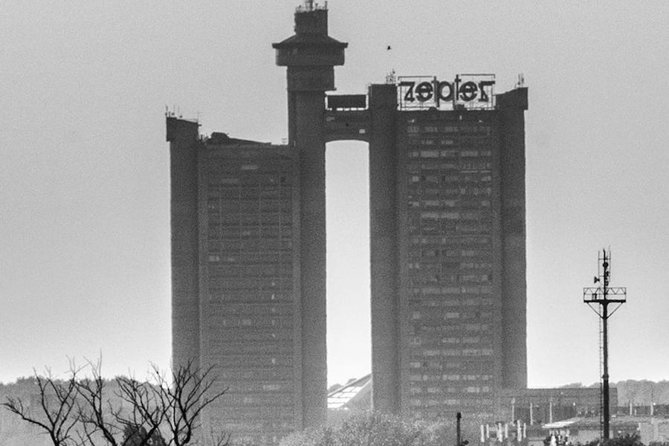
- New Belgrade’s brutalist architecture reflects Yugoslavia’s vision for a modern, functional society with raw, exposed concrete and angular forms.
- The Museum of Contemporary Art exemplifies the bold, socialist-inspired design principles of Yugoslavian brutalism with its expansive galleries and striking facade.
- The Sava Center, designed by architect Stojan Maksimović, showcases the imposing concrete and geometric forms characteristic of Yugoslavian modernism.
- The Genex Tower’s innovative Y-shaped footprint and use of glass and aluminum diverge from typical brutalist aesthetics, highlighting the creativity of Yugoslavia’s architectural movement.
- Navigating the architecture of New Belgrade provides insights into the complex cultural and political dynamics that shaped Yugoslavia’s evolving identity and legacy.
Significance of Brutalist Architecture
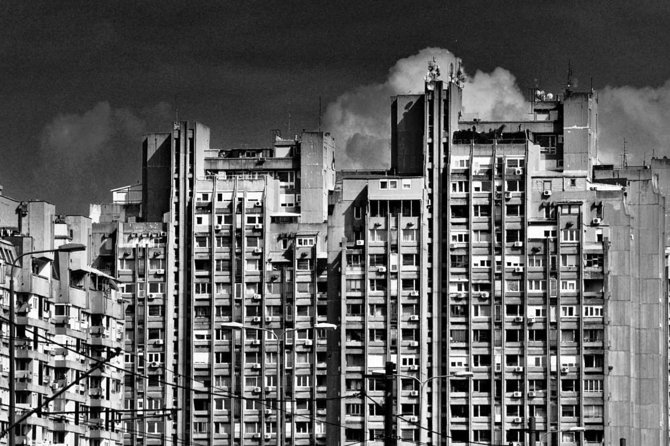
Brutalist architecture, characterized by its raw, unfinished aesthetic and use of exposed concrete, holds significant cultural and historical importance.
This distinct design approach emerged in the mid-20th century as a reaction against the ornate styles of the past, reflecting the socialist ideologies and practical needs of the time.
Brutalist buildings, such as those found in New Belgrade, often serve as physical representations of the Yugoslav government’s vision for a modern, functional society.
While controversial, this architectural style has gained recognition for its architectural integrity and as a symbol of a specific era.
Exploring Brutalist structures offers insights into Belgrade’s past and the sociopolitical context that shaped its urban landscape.
You can also read our reviews of more tours and experiences in Belgrade.
Exploring the Museum of Contemporary Art
As one delves into the architectural tour, the Museum of Contemporary Art emerges as a key focal point.
Nestled within the brutalist landscape of New Belgrade, this iconic structure stands as a testament to the bold vision of Yugoslavian socialist architecture. Its raw, exposed concrete facade exudes a sense of strength and functionality, while the building’s angular forms create a striking silhouette against the cityscape.
Visitors are invited to explore the museum’s expansive galleries, which house an impressive collection of contemporary art.
The tour guide’s insights shed light on the building’s design principles and the sociopolitical context that shaped its creation, offering a deeper understanding of this architectural marvel.
The Iconic Sava Center
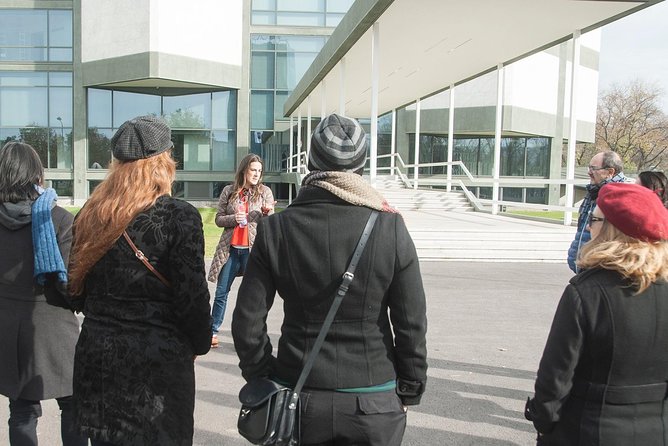
The Sava Center stands as another iconic structure along the tour route. Designed by renowned Serbian architect Stojan Maksimović, the Sava Center is a prime example of Yugoslavian brutalist architecture. Its imposing concrete facade and bold geometric forms command attention.
Inside, the grand auditorium and conference halls showcase the building’s functionality and adaptability. Visitors are struck by the sheer scale and grandeur of the Sava Center, which has hosted numerous significant events over the decades.
The tour guide delves into the building’s history, highlighting its role in Belgrade’s cultural and political landscape. As the tour winds down, the Sava Center leaves a lasting impression, a testament to the bold vision of Yugoslavian modernism.
Unique Design of Genex Tower
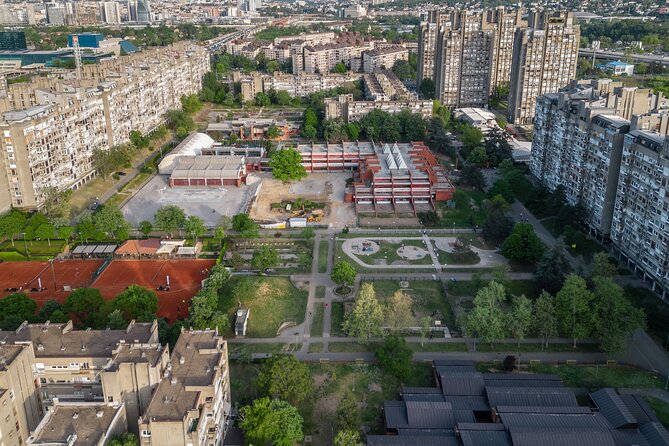
Amidst the striking brutalist structures, the Genex Tower stands as a remarkable architectural anomaly.
Designed by Mihajlo Mitrović, the tower’s unique silhouette features two interconnected towers with a distinctive Y-shaped footprint. This innovative design allows for more efficient use of space and optimal natural lighting.
The tower’s exterior is clad in glass and aluminum, a departure from the typical exposed concrete of the brutalist style. At 35 floors, the Genex Tower is one of Belgrade’s tallest buildings, its sleek profile a striking contrast to the heavy, angular forms of its socialist-era neighbors.
This captivating structure represents a bold departure from the architectural norms of the time, showcasing the creativity and vision of Yugoslavia’s modernist movement.
Yugoslavian Architectural Legacy
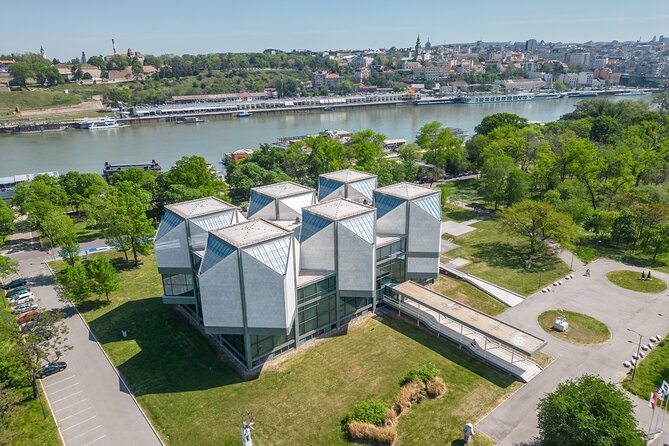
Rooted in the rich tapestry of Yugoslavian history, the architectural legacy of this region continues to captivate and intrigue. From the bold and brutalist designs of the New Belgrade district to the ornate socialist realism structures, Yugoslavian architecture reflects the country’s complex past and evolving identity.
| Building | Architect | Style |
|---|---|---|
| Museum of Contemporary Art | Ivan Antić | Brutalist |
| Genex Tower | Mihajlo Mitrović | Modernist |
| Sava Center | Stojan Maksimović | Brutalist |
| Palace of Serbia | Nikolaj Krasnov | Socialist Realism |
| Dobrinjska Residential Complex | Mihailo Mitrović | Brutalist |
This diverse architectural landscape offers a unique window into the cultural and political dynamics that shaped the region, inviting visitors to explore and appreciate its enduring influence.
- Northern Serbia: Sremski Karlovci and Novi Sad Full-Day Tour From Belgrade
- Day Trip From Belgrade: Gems of Eastern Serbia
- Belgrade Nightlife Bar Pub Club Crawl
- Taxi To/From Belgrade Airport To/From Belgrade City Center
- Blue Danube: Iron Gate National Park Tour With 1-Hour Speedboat Ride
- From Belgrade: Drina River House, Mokra Gora and Šargan 8 Railroad Tour
To embark on the "Architecture of New Belgrade – Brutalism Decoded" tour, visitors will first meet at the Museum of Contemporary Art, located in front of the stairs leading to the main entrance.
The tour lasts approximately two hours and covers significant Yugoslavian socialist architecture and brutalism. Attendees will visit five notable buildings, including the Museum of Contemporary Art and Sava Center, before concluding at the Sava Center.
While the tour isn’t wheelchair accessible, it’s near public transportation. Priced at $79.50 with free cancellation, the tour includes a professional guide.
Reviews praise the guides’ knowledge and insights into everyday life in Belgrade, though one visitor expressed disappointment in the lack of empathy and preparation.
Perspectives From Tour Participants
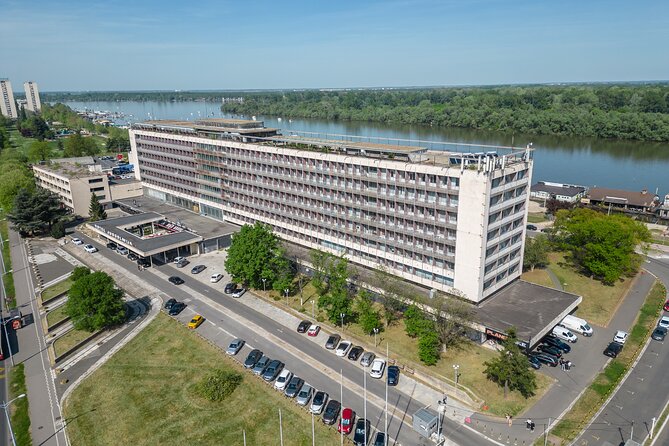
Tour participants offered a range of perspectives on their experiences with the "Architecture of New Belgrade – Brutalism Decoded" walking tour.
Reviewers praised the knowledgeable guide, who provided insightful commentary on everyday life in Belgrade and the unique architectural styles. Many found the tour to offer a refreshing perspective, exploring buildings off the typical tourist path.
However, one reviewer expressed disappointment, citing a lack of empathy and preparation.
Resources for Further Exploration
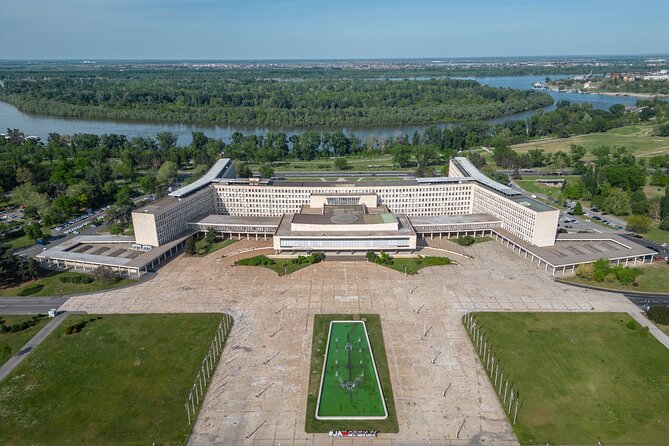
For those keen to dive deeper into Belgrade’s Brutalist architecture, several resources are available. The Walking Belgrade tour provides an insightful introduction, but further exploration can be found in books like "Concrete Utopia: Architecture in Yugoslavia, 1948-1980" and online databases like The Brutalist Map.
Visitors can also explore the Belgrade City Museum, which houses exhibitions on the city’s urban development. Plus, self-guided walking tours and mobile apps offer opportunities to discover hidden gems and uncover the stories behind these striking, sometimes controversial, modernist structures.
With a wealth of information and avenues to explore, there’s no shortage of ways to take in the architectural legacy of New Belgrade.
Frequently Asked Questions
Can the Tour Accommodate Large Group Sizes?
The tour can accommodate small groups, but it’s not intended for large groups. The private tour is for your group only, so the size is limited to ensure a personalized experience.
Are Food and Drinks Provided During the Tour?
No, food and drinks are not provided during the tour. The tour focuses on visiting significant brutalist buildings in Belgrade, with a professional guide offering insights and commentary. Participants will need to bring their own refreshments.
Is Photography Allowed Inside the Buildings?
Photography is generally allowed inside the buildings visited during the tour. However, visitors should check with the guide or property owners if any restrictions apply, as policies may vary across the different sites.
Can the Tour Be Customized to Focus on Specific Architectural Styles?
The tour can likely be customized to focus on specific architectural styles. Travelers should inquire with the tour operator about the possibility of tailoring the experience to their interests.
Do Participants Need to Bring Any Special Equipment or Attire?
Participants don’t need to bring any special equipment or attire. The tour takes place outdoors, so comfortable walking shoes and weather-appropriate clothing are recommended. No special gear is required to enjoy the architectural exploration.
The Sum Up
The architecture of New Belgrade offers a powerful window into Yugoslavia’s sociopolitical history and aspirations. Brutalist structures like the Museum of Contemporary Art, Sava Center, and Genex Tower reflect the government’s vision for a modern, functional society. These raw concrete forms challenge conventions, inviting deeper exploration into the cultural identity and legacy of Yugoslavia. The architectural tour provides an immersive experience, allowing visitors to navigate and appreciate this unique blend of design and history.
More Tour Reviews in Belgrade
- Your Personal Belgrade Photographer!
- Private Transfer From Belgrade Airport (Beg) to Novi Sad
- Serbia Travel, Novi Sad, Tara Park, Uvac Canyon, Stendnica Monastery, 4 Days Tour
- Private Belgrade Highlight Tour in Serbia
- Snow and Ski Experience Daytrip From Belgrade
- Discover Belgrades Nightlife With a Local
Not for you? Here's more things to do in Belgrade we have recnetly reviewed
- 3 Best Guided Tours In Belgrade
- 2 Best Craft Beer Tours And Tastings In Belgrade
- 6 Best Full-Day Tours In Belgrade
- 5 Best Food Tours In Belgrade
- 13 Best Private Car With Driver Services In Belgrade
- VIP Night – The In His Mind Experience Ticket in Belgrade
- Beauty of Medieval Serbia, Day Trip to Monastery Manasija and Resava Cave
- Private Murals of Novi Sad on Wheels
- Belgrade Private Walking Tour
- The 10 Tastings of Belgrade Private Food Tour
- Private Airport Transfer From Belgrade to Novi Sad
- Private Belgrade Street Art Tour
